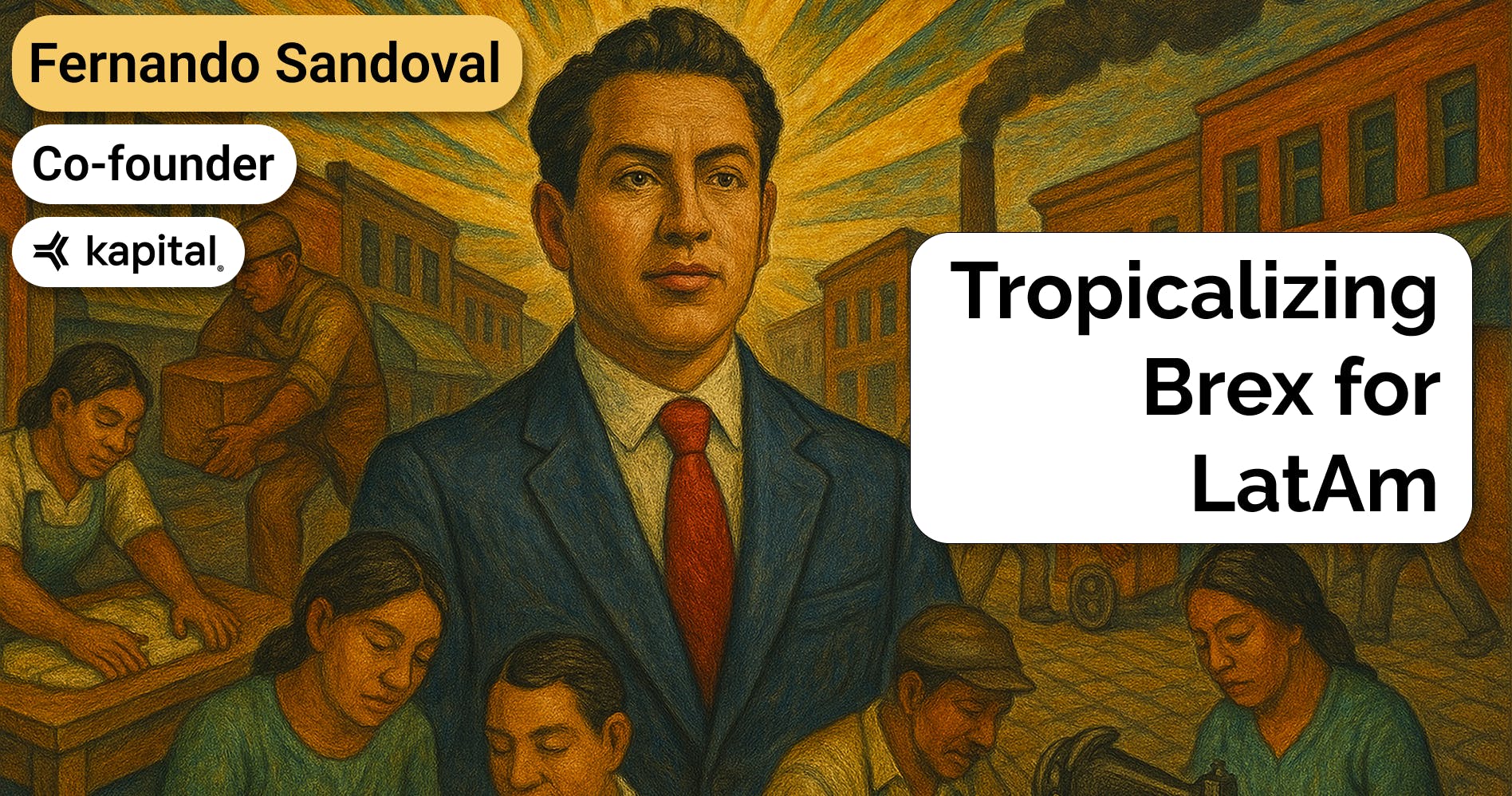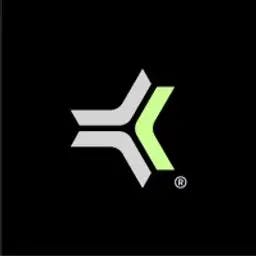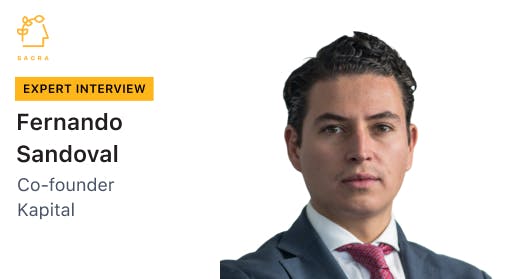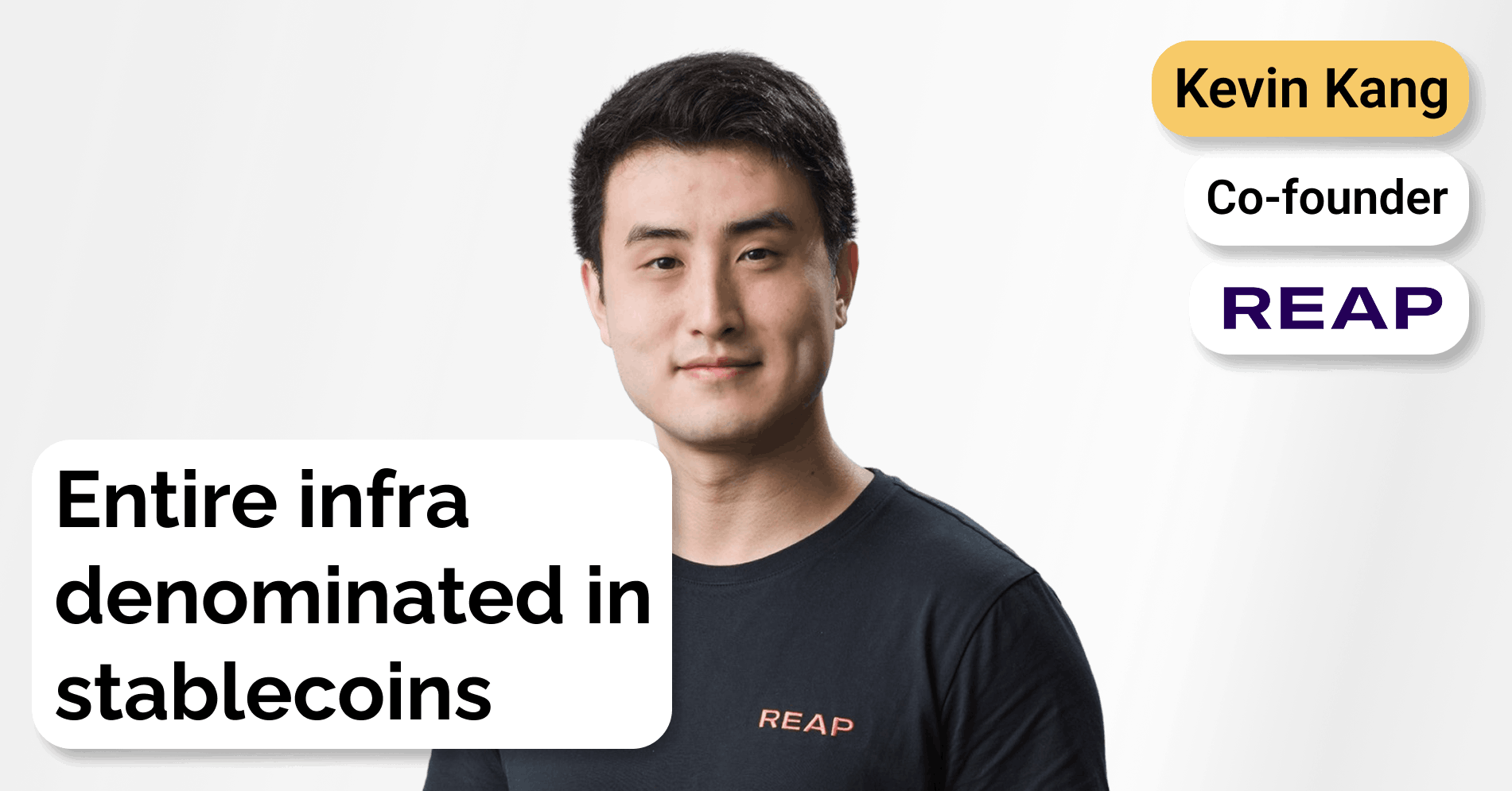Fernando Sandoval, co-founder of Kapital, on tropicalizing Brex for LatAm
 Jan-Erik Asplund
Jan-Erik Asplund

Background
We first talked to Kapital co-founders René Saul and Fernando Sandoval about the fintech opportunity in LatAm in January 2024, and we caught up with Fernando again in May to drill deeper into Kapital’s stablecoin treasury product as LatAm was emerging as a key geography for stablecoins.
Key points from our latest conversation via Sacra AI:
- In Latin America's volatile business environment—currency fluctuations, shifting trade tariffs, and unpredictable interest rate cycles— Kapital has adapted to monetize in any economic condition, generating revenue from deposits when rates are high, financing "buy now, pay later" through Kapital Flex when rates fall, and providing stablecoin options when local currencies destabilize. "Kapital Flex is the star product… 70% of SMEs in Latin America fail not due to lack of sales, but due to lack of cash flow. . . the corporations at either end of the supply chain have the leverage to change their payment policies every month. Suddenly they say, 'Well, I'm going to pay you in 150 days.' So what do you do? If all your equity is already invested in the company, it's not liquid, so that's where our solution comes in."
- Starting in Mexico, Kapital initially expanded to Colombia over Brazil, looking to expand into large markets first in LatAm and then globally that lack competition to servicing SMEs (less than 250 employees, ~50% of global employment), particularly where incumbent banks consider them too small for relationship banking and fintechs focus on consumer. "Legacy banks serve big corporations and blue-chip companies very well, and consumers decently. But there have always been two empty markets... the SME market globally, which is gigantic and what really underpins countries' economies... Whenever you ask them, 'How much do I owe? How much am I earning?' they never have an immediate answer. It's always 'Let me check that.'"
- The lack of competition in these markets has given Kapital a head start to roll up the bank account (Mercury), corporate card (Brex), expense management (Ramp), AP/AR (Bill.com), and treasury (Meow) into an all-in-one, with line of sight into rolling up the entire SME backoffice including HR, payroll, and employee benefits. "There are many additional value offerings that are very easy to add and continue complementing. Some of that is long-term planning. But in the short and medium term, once you have the client and have earned their trust because you're giving them money, it's very easy to cross-sell.”
For more, check out this other research from our platform:
- Fernando Sandoval, co-founder of Kapital, on stablecoins for cross-border payments
- Kapital: the $72M/year Nubank for SMBs
- Stablecoin diplomacy
- Kapital revenue, growth rate & funding
- The state of the LatAm startup ecosystem
- René Saul and Fernando Sandoval, co-founders at Kapital, on the fintech opportunity in LatAm
- Anthony Peculic, Head of Cards at Cross River Bank, on building a fintech one-stop shop
- Farooq Malik and Charles Naut, co-founders of Rain, on stablecoin-backed credit cards
- Arjun Sethi, co-CEO of Kraken, on building the Nasdaq of crypto
- Kraken at $1.5B up 128% YoY
- Bhanu Kohli, CEO of Layer2 Financial, on stablecoin-backed payments for platforms
Questions
- I'd like to begin by framing everything - what were the things that really gave you momentum last year? And which areas of the business did you really see advances in 2024?
- Regarding the banking license, is the playbook to do the same in markets like Colombia and Chile, or is that plan only for Mexico?
- We've talked quite a bit about the platform and how clients use it. When clients look at their accounts with Kapital, do they pay monthly, like a traditional SaaS product subscription? Can you tell me more or less how the monetization works in general?
- How do you decide what price to charge for the basic corporate dashboard? How do you decide that base subscription price?
- There's a lot of talk here about the impact that interest rate changes are having on different fintechs, how they're going to adapt. Is the movement of interest rates a factor for you? I imagine it's different in each country?
- And regarding stablecoins, how has that grown? Has it continued to be an important part of the product or is it not core to the business?
- We're seeing a lot of news about tariffs and potential actions Trump might take with Colombia, Mexico, etc. Since many of Kapital's clients are exporters, is this a relevant issue for Kapital and your clients?
- Let's talk about some products you introduced around the end of 2024. One is Kapital AI, which I understand provides AI tools to give businesses more visibility into financial operations and analytics. You also launched Kapital Rewards. Could you talk about these products? Why did you decide to launch them last year and what do they say about the direction Kapital is taking?
- Does that mean you can negotiate with telecom companies or other Kapital clients to create a kind of exchange and revenue share, or is it unidirectional?
- And the Kapital Rewards part for consumers – I read that the plan is to expand Kapital Rewards to consumers as well. What's that facet?
- Speaking about spend management and corporate cards, we recently spoke with Brex, and they told us they see themselves as an international platform. They have a direct relationship with Mastercard, which allows them to issue cards locally in places like Mexico. I understand Brex is primarily focused on the US market, but looking at it globally, help us understand how you would position yourself against a Brex. In what areas might you compete in the future?
- So the proposition depends a lot on two things. One is customer acquisition. Many fintech startups find it easy to acquire customers at the beginning, but then they have to spend more and more money to acquire customers when entering new markets or when they've exhausted the early adopters. Where is Kapital on that adoption curve, and how do you plan to manage customer acquisition costs?
- That banking license came with your acquisition of Autofin in 2023. And with Autofin you also acquired some physical presence, right? Is that physical presence important to you? Will you expand it?
- If you're already a kind of Bill.com or a Brex or Ramp, wouldn't it be logical to also be a Rippling and handle everything related to HR and payroll? Kapital Rewards is different, but as we noted it will have a B2B2C aspect. Are you planning a full entry into the payroll business?
- I also wanted to talk about AI in the future. I imagine if you made more than 30,000 loans last year, that's a fairly high volume. To manage all that volume in loans, do you use AI in your credit modeling?
- That ties into what you were saying earlier about the network effect. That's another part of the network effect – with more data, you can streamline credit and improve it too. I also wanted to talk about AI in the future. There's a lot of talk about agents. How could that work for you? In what directions do you plan to take AI and how far do you plan to go with it?
- How do you decide what's next? You already have a fairly broad portfolio of products and operations in three countries, if I'm not mistaken. How do you decide what the next step is? How do you decide the sequencing?
- And regarding crypto, do you have any opinion that might be different from others who aren't as familiar with how main street businesses already use crypto? Is it already part of daily life? How will crypto fit within Kapital's operations in three years?
- To finish, let's close our eyes and wake up in three years. We talked about the great SME opportunity that exists in many countries. What world has Kapital created?
Interview
I'd like to begin by framing everything - what were the things that really gave you momentum last year? And which areas of the business did you really see advances in 2024?
If you look at fintech companies and how they developed globally, they generally launched focusing on commodity products. Maybe they had a good UX, a prettier application, a nicer customer journey, something sleeker than traditional financial services products offered. But ultimately, these products have been commoditized. It's just a card here, a card there, a wallet here, a wallet there, a payment here, a payment there. What's the difference? Price.
If you focus on competing in commoditized categories, sooner or later any legacy player or competitor can offer a better value proposition and steal your customers, because you're merely competing on pricing and not generating fundamental differentiation that creates stickiness for the client.
So, the next step fintechs took is to become very transactional, embedding themselves in transactions and focused on helping businesses streamline their operations. Fine. But the question today is: where is all this going? What will allow you to deliver differentiated and lasting value as a fintech?
From the moment we started in 2020, we said we couldn't be a commodity business. Because when a big bank with deep pockets — legacy players like BBVA, Banorte, HSBC, Itaú, etc. — puts together a dedicated team and executes well despite any internal issues, they can easily steal your business. So we said we really need to compete on value. And how do you really generate value for a small- or medium-sized enterprise, for an SME?
We quickly saw that the main problem for these business owners is that they never know exactly where they stand. When business owners and entrepreneurs start to scale their companies, they’re operating, producing, selling, collecting — they’re managing everything. As companies start to scale in magnitude they begin losing track of the business. Access to technology that gives you real-time information and helps you organize that, it's out of reach, it's too expensive. SAP, Oracle, etc., are not for SMEs — that's the reality.
So what do entrepreneurs do? They start managing everything in Excel, and it’s easy to lose track. You may have your trusted accountant or administrator who operates the company administratively. But whenever you ask them, "How much do I owe? How much am I earning? Where am I growing the most? How much am I paying?" etc., they never have an immediate answer. It's always "Let me check that. Let me run the numbers."
So we said, if this is the main problem for SMEs, let's redesign what a banking platform can be. Let's not just create a wallet, but rather create a corporate dashboard where you have visibility of where the business stands day-to-day. That’s why we say we are the 1st data-driven neobank. Data is in our core, and data is what we leverage to provide solutions. We onboard you and from day one give you your daily sales, daily expenses, profits, all the details of your accounts receivables and accounts payables — where you stand. So we organize everything and give customers that real-time data to know if they’re selling more or less, who they need to collect from. Then we offer a one-stop shop for everything a business needs operationally. We give you multiple currency accounts, 24/7 payments, working capital loans, corporate cards, debit, credit, treasury investments. With that, we close the loop.
We quickly realized our thesis was correct. By generating this information and giving the power of all that information back to the company, that's what generated traction for us. When we started, clients were using our platform once a month. Now they use it daily. And they use it for one or two hours daily. That's when you realize you're generating value and solving problems.
That's what powered all the growth and why we scaled so strongly in 2024. So we started in 2020, we scaled up, then [in 2023] we bought a banking license from a bank [Autofin] in Mexico. In B2B everything is about trust. How do you generate trust? With a great product, great service, and most importantly for companies, by being protected by the government. Because if they're going to leave their money with you, you need to have the backing of a banking license.
Latin America works very differently from the United States. In the US right now, it's about APIs, regulation, etc. In Latin America, having a banking license is what’s key. There are only about fifty banks on average per country. It's a huge barrier to entry, and the potential of a banking license is that it gives customers that security. This is the power to innovate without being dependent on third parties—we control our time-to-market.
Regarding the banking license, is the playbook to do the same in markets like Colombia and Chile, or is that plan only for Mexico?
Each market in Latin America is different. Unlike Europe, where you can have a bank in one European country and it works in other countries, each Latin American country has its own rules. So you need to understand what the most appropriate strategy is. But yes, we are believers that the end game is a regulated game. And the faster you integrate yourself with local regulations, the more that will help you boost your business.
We've talked quite a bit about the platform and how clients use it. When clients look at their accounts with Kapital, do they pay monthly, like a traditional SaaS product subscription? Can you tell me more or less how the monetization works in general?
Of course, we have a revenue mix, but what generates stickiness primarily is the corporate dashboard, for which we charge a monthly fee or annual fee, depending on what each client wants. That’s what generates that client stability, but then when you add the one-stop shop, you start generating cross-selling and upselling the client. For example, you have digital confirming with Kapital Flex, which is the star product.
With three clicks you get financing, and we pay your suppliers directly. It's like a "buy now, pay later" for B2B. You select the number of installments you want to pay with. You get inventory, you get a discount because you paid immediately, you get a discount because you bought more volume, and with that you've already covered the interest cost. And you might say, "Hey, Kapital, I'm going to pay you back in nine months." Because you know you're going to move that inventory within nine months or six months. So we give SMBs back that power, flexibility, and control of their cash flow.
Because do you know what the problem with SMEs is? SMEs don't have control of their cash flow. The cash flow is controlled by the client, say Walmart, or by the supplier. And all that revenue you generate, you have to send to the supplier so they send you inventory, so you can continue producing.
But suddenly, what happens? Lets say your clients are very large clients, Kraft, etc., and they suddenly change payment policies, so instead of paying in 90 days, they'll pay you in 120 days. Boom, that puts you in a liquidity crunch. Seventy-percent of SMEs in Latin America fail not due to lack of sales, but due to lack of cash flow. Because the corporations at either end of the supply chain have the leverage to change their payment policies every month.
If a client says, "well, I'm going to pay you in 150 days now." What do you do? If all your equity is already invested in the company, it's not liquid. So that's where our solution comes in. We generate interest and commission fees from that product. But we also give them power to negotiate with their vendors and get a discount by paying on time or purchasing more, reducing the effective rate you are getting charged. That's why the product is so powerful.
Then we have corporate expenses, which is 10% of customers’ spending, but we also help you control corporate spend. But Kapital's solution is not just about corporate expenses, it's about the complete flow, both sides — we give you visibility into both income and expenses, and we give you solutions in each segment of the flow to be able to manage it.
How do you decide what price to charge for the basic corporate dashboard? How do you decide that base subscription price?
For the corporate dashboard and the current account, we basically looked at the value generated compared to what was charged for a corporate bank account. So we're charging what a typical corporate account costs. And ours is also a corporate wallet, but also much more. It's not just wire in, wire out. That's where we generate value. That's how we determine the pricing.
There's a lot of talk here about the impact that interest rate changes are having on different fintechs, how they're going to adapt. Is the movement of interest rates a factor for you? I imagine it's different in each country?
It has its pros and cons, but the big advantage is that we are a neobank with a bank license at the core. We're not just connected to a bank. So what happens? When interest rates are high, the economy is trying to curb inflation.
But what does it allow you to do? Build a strong client base for deposits. That has strengthened us and allowed us to continue gaining clients on the deposit liability side. When rates go down, as they are now, it starts to open up more opportunities to place loans. So we're countercyclical in that sense.
Because we generate income on both sides of the see-saw. So we have a very robust model, that's why we're a one-stop shop, and that's why we're diversified, because it's not just lending, lending, lending. We also offer savings and treasury services, for example.
And regarding stablecoins, how has that grown? Has it continued to be an important part of the product or is it not core to the business?
One hundred percent. Economic volatility is a driver for stablecoins. It's becoming much more relevant over time. When you’re doing international transfers, because of the instability that we see in Latin America, having money in dollars is crucial.
This solution is indispensable for customers, so they can access dollars seamlessly. In our countries, things can change overnight, and your currency depreciates. Having a position in the world's strongest currency provides security. There’s a lot of potential here.
We're seeing a lot of news about tariffs and potential actions Trump might take with Colombia, Mexico, etc. Since many of Kapital's clients are exporters, is this a relevant issue for Kapital and your clients?
Yes, as you know, Kapital started in Mexico, and Mexico has a close relationship with the United States. We are the main trading partner of the United States. It's an opportunity for our solutions, because we can support small and medium businesses through this volatility.
Let's talk about some products you introduced around the end of 2024. One is Kapital AI, which I understand provides AI tools to give businesses more visibility into financial operations and analytics. You also launched Kapital Rewards. Could you talk about these products? Why did you decide to launch them last year and what do they say about the direction Kapital is taking?
We've always been characterized by doing things differently. If you remember from our previous call, Marcelo, I told you how fintechs start as a commodity product with a good application. Then they evolved to become transactional entities that streamline operations. Where we believe things are heading is toward truly empowering businesses by being their financial coach. That's why we launched Kapital AI.
We have so much information – we don't just focus on corporate expenses, which is only 10% of our customers’ spending. We see all the complexity, the company's entire flow – all income, all expenses, from a macro view to a granular view, by client, by month, by day, etc. This generates so much information for our LLMs. What did we do with that? We empower the business owner.
The Kapital AI module helps customers automate their entire finance department. We automatically know about recurring payments, aggregate them, pay them, and remove that operational burden. We automatically detect important variations in invoices to be paid and immediately notify the owner to see if there's something wrong in their operations.
We send a monthly report on the financial situation of the company so they really know where they stand. We have a financial planning module with projections so they know where they’re headed. And it's very simple, because we're talking about SMEs with fewer than ten employees.
It's about simplifying the entire financial operation of the business using all the data we already have. This is precisely how we compete on value. It's not just opening a bank account, a current account, or a wallet that only processes payments.
It's really about what's happening with those payments. Reconciling them, understanding the company's cash flow. That's the essence of it.
Meanwhile, the Kapital Rewards module is something very innovative that my co-founder developed. In the United States and other parts of the world, there's fierce competition in corporate expenses. Everything is cashback, cashback, cashback. But when you step back, these programs don't stand on a sensible economic model. They're giving away money, precisely at the point where they generate margin.
So we asked ourselves: How do we generate value for SMEs? What are their main expenses? Rent. Help them pay rent and give them points, a type of cashback for rent payment. Remember, at Kapital it's about actually managing operations through our banking. So when you pay rent with Kapital or receive rent payments through Kapital, you accumulate points that can be exchanged for benefits. These benefits are discounts on telecommunications, internet, things that make sense for SMEs, things that they need.
So it's a type of cashback, but focused on the SME's operations and the complete flow of the SME’s finances, not just the corporate expense.
Does that mean you can negotiate with telecom companies or other Kapital clients to create a kind of exchange and revenue share, or is it unidirectional?
No, it works both ways. We send customers products, the rewards and benefits packages, etc., and we're sending clients to the providers. But the benefit to us is mainly that the rewards are another reason that customers come to our platform more and more, and so a virtuous cycle because we also end up generating more deposits.
It's a win-win.
And the Kapital Rewards part for consumers – I read that the plan is to expand Kapital Rewards to consumers as well. What's that facet?
If you have the company, you already have access to all the employees. So you become much more interconnected throughout the company, and there are many things you can do as you scale and continue generating value.
But right now, the core is B2B, and that’s where we are focused.
And in extending Rewards to consumers, that would also help us capture more deposits and liquidity as well.
Speaking about spend management and corporate cards, we recently spoke with Brex, and they told us they see themselves as an international platform. They have a direct relationship with Mastercard, which allows them to issue cards locally in places like Mexico. I understand Brex is primarily focused on the US market, but looking at it globally, help us understand how you would position yourself against a Brex. In what areas might you compete in the future?
Brex is much more focused on the wallet and corporate expenses. If you want to compare us with a player in the United States, there's no one today who does the one-stop shop that we do. That's what we see as very positive – that innovation can also happen in Latin America. We’re not just launching copycat startups. You can innovate by “tropicalizing” solutions for your market and generating greater value.
As I told you, we're a Brex and a Ramp with all the data, but also a Bill.com for all the billing aspects. We're all three combined.
Where are we headed? Well, we believe the SME opportunity is a global problem. Globally, you see that legacy banks serve big corporations and blue-chip companies very well, and consumers decently. But there have always been two empty markets: the informal market in emerging economies or the cash economy, which is not our market, and the SME market globally, which is gigantic and what really underpins countries’ economies. So the mission is to continue helping and empowering SMEs to grow with technology like software banking, and that’s the reason for the speed of our growth.
So the proposition depends a lot on two things. One is customer acquisition. Many fintech startups find it easy to acquire customers at the beginning, but then they have to spend more and more money to acquire customers when entering new markets or when they've exhausted the early adopters. Where is Kapital on that adoption curve, and how do you plan to manage customer acquisition costs?
Customer acquisition is a great question. When you're B2B, customer acquisition often becomes challenging at scale. But our great advantage is that we have so much data. All that information. Every time an SME operates with us, we know who they pay, who pays them, etc. And there we generate a lot of information that helps us target those types of leads.
So one client starts to generate a massive network effect in terms of all possible prospects you can serve. Then it starts to get exponential. It's a bit of the flywheel effect. The first year it cost us a lot to turn the wheel. Now we're much more agile, and it's becoming increasingly easier, and moving faster.
And why? One big difference is visibility. That's in part why we acquired the banking license, because we now have complete visibility into businesses’ cash flow. Everything connects with us.
That banking license came with your acquisition of Autofin in 2023. And with Autofin you also acquired some physical presence, right? Is that physical presence important to you? Will you expand it?
Yes, I think it's important to understand that Latin America is a hybrid market, and you have to have a hybrid strategy.
Why? Because of the state of development of the region in which you're operating. Latin America isn't the United States, this isn't the Nordic countries. It isn't South Korea or Japan. You have to adapt to the market you're serving to continue generating value.
If you're already a kind of Bill.com or a Brex or Ramp, wouldn't it be logical to also be a Rippling and handle everything related to HR and payroll? Kapital Rewards is different, but as we noted it will have a B2B2C aspect. Are you planning a full entry into the payroll business?
I think you’ve already said it, Marcelo. There are many additional value offerings that are very easy to add and continue complementing. Some of that is long-term planning. But in the short and medium term, once you have the client and have earned their trust because you're giving them money, it's very easy to cross-sell.
But we just focus for now in B2B, there is so much to do and problems to solve that our customers need.
I also wanted to talk about AI in the future. I imagine if you made more than 30,000 loans last year, that's a fairly high volume. To manage all that volume in loans, do you use AI in your credit modeling?
Yes, we use AI. We have our own credit scoring model where we analyze the free cash flow of the company, we analyze all the KYB for fraud detection, and very quickly we’re able to send a link with the offer to the client. This modeling is precisely what gives us so much agility. It's not a traditional analysis of financial statements, it's analyzing all the cash flow and invoicing. That's the whole difference.
That ties into what you were saying earlier about the network effect. That's another part of the network effect – with more data, you can streamline credit and improve it too. I also wanted to talk about AI in the future. There's a lot of talk about agents. How could that work for you? In what directions do you plan to take AI and how far do you plan to go with it?
We have to become our customer’s advisor and financial coach. Nothing less. And the great advantage is that we have all the information to be able to do it; other companies don't. So, the AI module is the main example, but we're also releasing our agent called Kapi.
Kapi will give you all the information you need – reporting, management, payment automation, reconciliations. Now imagine having your company's information at your fingertips. As we tell our clients: If you don't know your numbers, you don't know your business. Kapital gives you your numbers.
How do you decide what's next? You already have a fairly broad portfolio of products and operations in three countries, if I'm not mistaken. How do you decide what the next step is? How do you decide the sequencing?
Depending on the size of the market and the shape of the problem we detect. Why did we go to Colombia right away? Because competition was very low and the problem was gigantic. Nobody was supporting Colombian SMEs.
If you go to Brazil, there's already too much competition. I don't mean it's not an opportunity, but the gameplan would have to be different. If we want to go to Brazil, I think we'd have to enter by buying a company, instead of starting from scratch. So basically, we define the size of the problem, how the market looks, what the competition is, and what strategy to use for the ramp-up.
And regarding crypto, do you have any opinion that might be different from others who aren't as familiar with how main street businesses already use crypto? Is it already part of daily life? How will crypto fit within Kapital's operations in three years?
In terms of payments, it will become more and more relevant. But it goes hand-in-hand with regulation. As regulation advances, you'll see the release of many products. We're ready; we just need the rules of the game to be set. I think the Americans are already embracing this idea, which is very positive.
To finish, let's close our eyes and wake up in three years. We talked about the great SME opportunity that exists in many countries. What world has Kapital created?
Providing immediate access to company information. I think it's a game changer because even if you're a medium-sized or large company and have Oracle or SAP, etc., ask yourself how often you see the reports. You never have them immediately, no matter what they sell you. So that's one of the main differentiators we have. We empower SMBs to grow, and that’s what they need.
Thanks to our technology, you have access to that data, and that's why we're growing. Because no one is really doing it in this market. We are. Why? Because you have to stop seeing the bank as a transaction.
You have to see the bank as an ally that provides the information you need to operate your business. It's not about lending to you, it's about helping you know when to take the loan. Knowing how to make those decisions is the key part, and that's precisely where we come in.
Disclaimers
This transcript is for information purposes only and does not constitute advice of any type or trade recommendation and should not form the basis of any investment decision. Sacra accepts no liability for the transcript or for any errors, omissions or inaccuracies in respect of it. The views of the experts expressed in the transcript are those of the experts and they are not endorsed by, nor do they represent the opinion of Sacra. Sacra reserves all copyright, intellectual property rights in the transcript. Any modification, copying, displaying, distributing, transmitting, publishing, licensing, creating derivative works from, or selling any transcript is strictly prohibited.
















